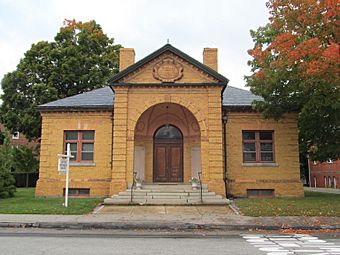Front Street Historic District (Exeter, New Hampshire) facts for kids
Quick facts for kids |
|
|
Front Street Historic District
|
|

Former Public Library
|
|
| Location | Front St. to the jct. of Spring and Water Sts., Exeter, New Hampshire |
|---|---|
| Area | 45 acres (18 ha) |
| Architect | Multiple |
| Architectural style | Greek Revival, Federal |
| NRHP reference No. | 73000270 |
| Added to NRHP | July 5, 1973 |
The Front Street Historic District in Exeter, New Hampshire, is a special area in the town's old center. It stretches along Front Street for about five blocks. This district is full of buildings from the 1700s and 1800s. Many of these old homes, churches, and public buildings are still in great shape. In 1973, this area was added to the National Register of Historic Places (NRHP). This means it's officially recognized as an important historical site.
Contents
Welcome to Front Street Historic District!
This historic district covers about 45 acres (18 hectares) in central Exeter. It starts near the commercial waterfront and goes along Front Street to Gale Park. The district also includes some busy blocks between the Phillips Exeter campus and Water Street.
A Peek into Exeter's Past
Front Street is one of Exeter's oldest roads. It has always been an important path leading west. Over time, many important buildings were built along this street.
How Exeter Began
Exeter was founded in 1638 by a man named Rev. John Wheelwright. He and his followers came here because they had different religious ideas. They had been asked to leave the Massachusetts Bay Colony to the south. Exeter grew quickly because of its location on the Squamscott River. This river was perfect for building ships and shipping lumber. The town center grew on the south bank of the river.
Front Street's Journey
Front Street became a major road for people traveling west. In 1783, the famous Phillips Exeter Academy was built here. The lower part of Front Street, near Water Street, became the town's civic center. This is where many public buildings were located.
The The Congregational Church in Exeter was built on Front Street in 1798. Many homes from the early 1800s also sprang up nearby. As you go further west from the academy, the houses become a bit more spread out. After passing Gale Park, the area starts to feel more like the countryside. Gale Park is a small, triangular park where Front and Linden streets meet.
Famous Buildings You'll Find Here
The Front Street Historic District is home to many interesting buildings. Each one tells a part of Exeter's story.
Homes with History
One important building is the Ladd-Gilman House. It's a National Historic Landmark and is now a history museum. You can visit it to learn more about the past.
Another beautiful home is the Dudley House. It's on the south side of Front Street. This house is a great example of the Federal style of architecture. This style was popular in the United States after the American Revolution.
At the far western end of the district, you'll find the Moses-Kent House. This house shows off the Second Empire style of architecture. This style was popular in the mid-1800s and often features a special kind of roof called a mansard roof.
These buildings help us understand what life was like in Exeter many years ago. They show us how architecture and the town itself have changed over time.
 | Delilah Pierce |
 | Gordon Parks |
 | Augusta Savage |
 | Charles Ethan Porter |



